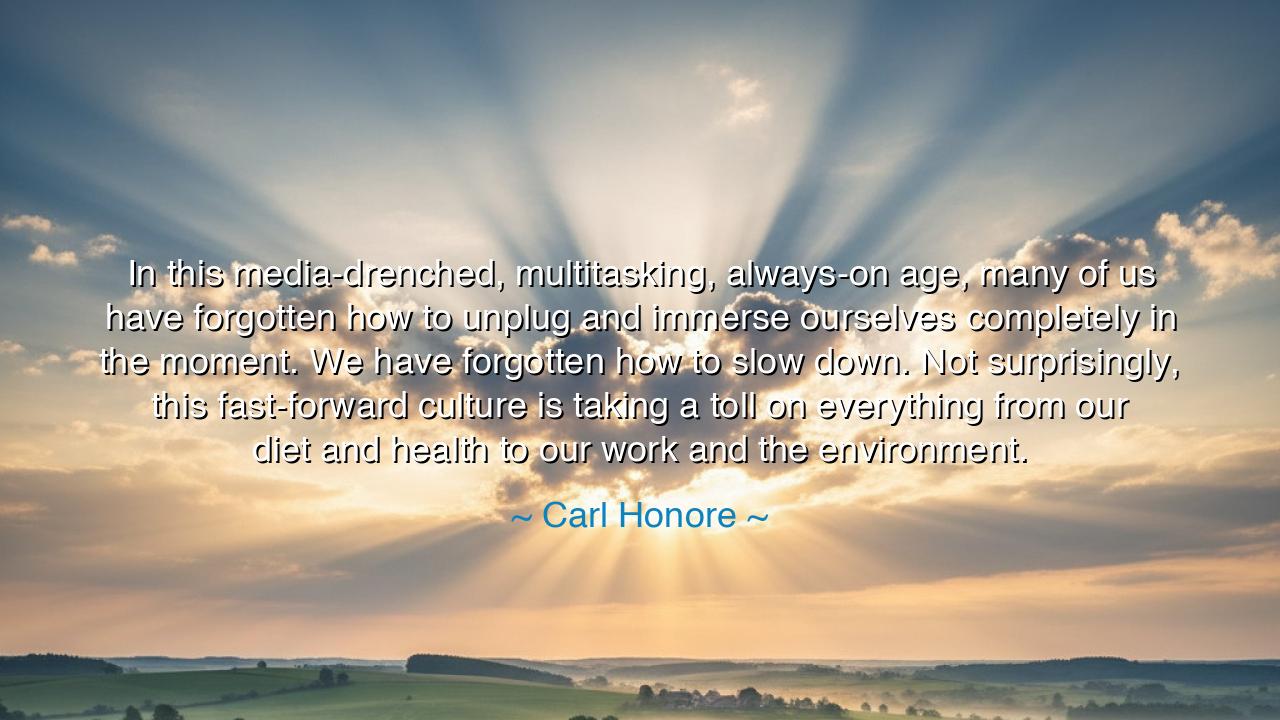
In this media-drenched, multitasking, always-on age, many of us
In this media-drenched, multitasking, always-on age, many of us have forgotten how to unplug and immerse ourselves completely in the moment. We have forgotten how to slow down. Not surprisingly, this fast-forward culture is taking a toll on everything from our diet and health to our work and the environment.






"In this media-drenched, multitasking, always-on age, many of us have forgotten how to unplug and immerse ourselves completely in the moment. We have forgotten how to slow down. Not surprisingly, this fast-forward culture is taking a toll on everything from our diet and health to our work and the environment." These insightful words from Carl Honore echo the deep crisis of our time: the loss of the art of slowing down in a world that moves ever faster. In this era of constant connectivity, where we are bombarded with information from every corner of life, we have forgotten the essential value of presence—the ability to fully immerse ourselves in the moment without the distractions of our multitasking culture. Honore speaks to a truth that has been understood by wise men and women for centuries: haste, distraction, and overload degrade the quality of life, diminishing our ability to truly experience the world, to connect with others, and to preserve our health and well-being.
In the ancient world, the need to cultivate stillness and presence was highly revered. The Greeks understood that true wisdom did not come from rushing through life, but from moments of reflection and contemplation. The philosopher Aristotle, in his work Nicomachean Ethics, wrote about the importance of achieving a balance between action and reflection. He argued that virtue lies in the ability to engage in the world with intention—to act, but also to pause and reflect, so that each action aligns with the greater good. This wisdom is not far from what Honore speaks of: to slow down is to reconnect with the deeper aspects of life, to allow for the type of awareness that leads to true health, fulfillment, and understanding.
The Stoics, like Seneca and Epictetus, also understood the dangers of rushing through life. They taught that the distractions of the world—whether they be external pressures or internal ambitions—could blind us to the most important things: the health of our spirit, our relationships, and our place in the universe. Seneca in his letters warned against the frantic pace of life, urging individuals to find time for inner peace and to avoid the temptation of constant action. This is precisely the issue that Honore identifies in the modern world: in our quest for efficiency and productivity, we have neglected the importance of slowing down and finding balance, which in turn affects our health, our work, and even our connection to the environment.
Consider the life of Confucius, who, despite living in a tumultuous time of war and upheaval, valued the importance of reflection and personal harmony. Confucius believed that good governance, both personal and public, could only arise from leaders who took the time to cultivate inner peace, to listen deeply, and to act with thoughtfulness. In this way, he exemplified the balance between action and stillness, understanding that true wisdom comes from not rushing through life, but from engaging deeply with each moment. The slow pace of his philosophy stood in stark contrast to the hurried nature of the world around him. Like Honore, Confucius knew that in order to thrive, we must not succumb to the distractions of the world but instead must take the time to reflect, act intentionally, and preserve the things that truly matter.
In today’s world, Honore’s observation is painfully true: the fast-forward culture—a culture driven by constant media, multitasking, and instant gratification—has taken a toll on our bodies, minds, and societies. The constant rush to produce and consume leaves little room for the deep connection we need to foster health, creativity, and sustainability. The impact is clear: stress is on the rise, relationships suffer from neglect, and environments are exploited in the rush for short-term rewards. Just as the ancients understood that rushing through life damages the soul, so too does the modern obsession with speed diminish the very aspects of life that bring us joy and meaning.
The lesson in Honore’s words is both urgent and timeless: we must reclaim the art of slowing down in a world that celebrates hustle and overload. If we are to live fully, to connect deeply with others, and to preserve our health and the environment, we must prioritize mindfulness, reflection, and deliberate action. The fast-paced nature of the world can lead to anxiety, burnout, and disconnection, but the solution is not to fight against the world’s speed—it is to choose to slow down and regain control over the rhythms of our lives.
In practical terms, this means carving out time each day to unplug, to rest, to connect with nature, and to reflect on what truly matters. It means setting boundaries on the demands of technology, reducing distractions, and embracing a simpler, more intentional way of living. Like the ancients, we must learn to find balance between action and stillness, between work and rest, between consumption and reflection. By embracing slowness, we can regain the quality and depth of life that our modern age threatens to rob from us. Let us take Honore’s wisdom to heart and build lives that are not defined by the speed of our tasks but by the depth of our presence in the world.






AAdministratorAdministrator
Welcome, honored guests. Please leave a comment, we will respond soon